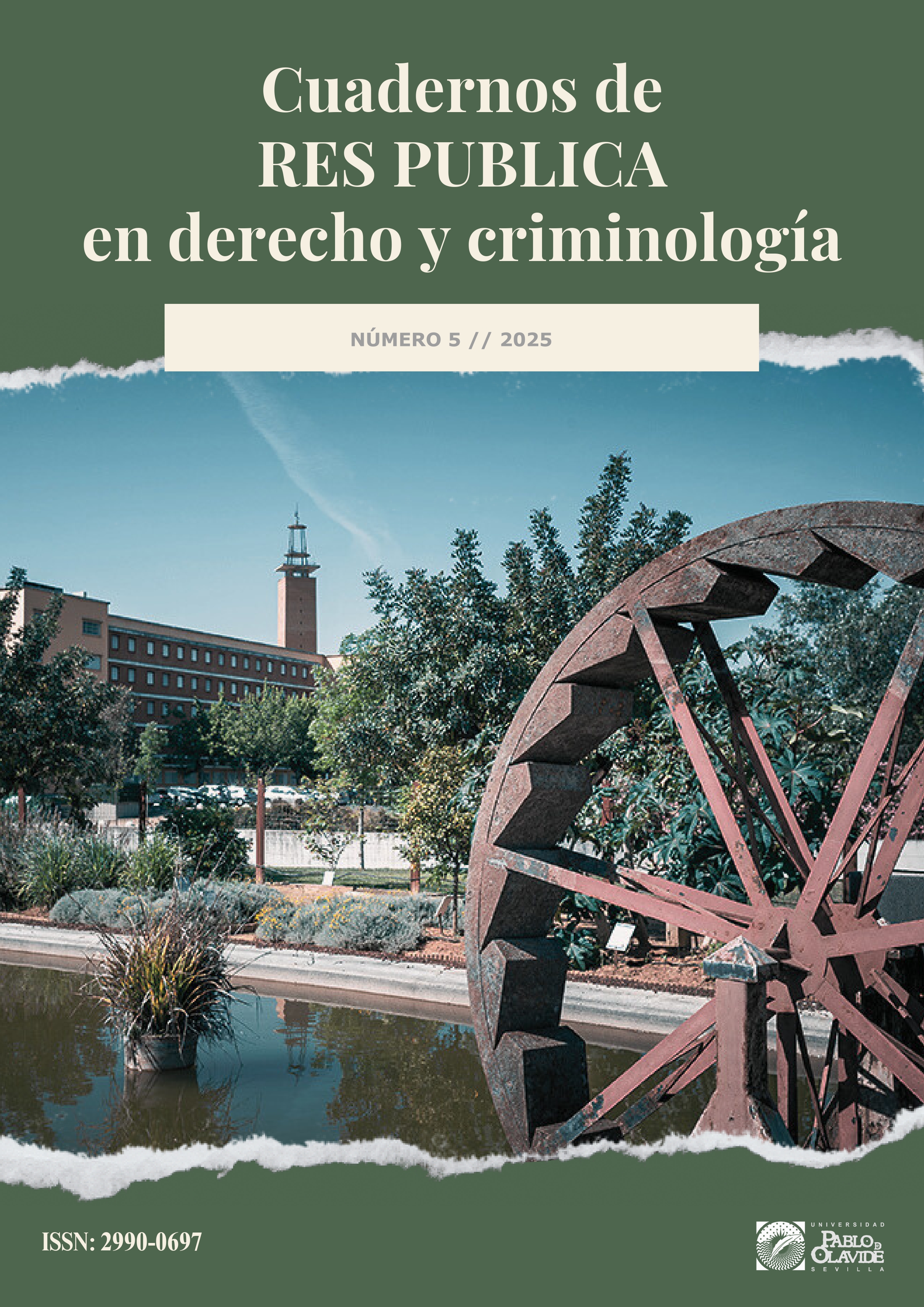Desarrollo emocional adolescente a través de las actividades asistidas con caballos
DOI:
https://doi.org/10.46661/respublica.11345Palabras clave:
terapias ecuestres, educación emocional, adolescencia, Desarrollo emocionalResumen
La investigación en el ámbito de las actividades asistidas con animales, avanza en mayor medida en los últimos años y cada vez más estudios científicos confirman la relación especial y emocional de un vínculo positivo y beneficioso entre humano-animal para el bienestar emocional de las personas. Así, las intervenciones asistidas por animales, entre ellas con caballos, son muy demandadas en ámbitos psicoeducativos y se van ampliando a la sanidad y a lo socioeducativo. En este trabajo se presenta un estudio realizado en el contexto de la naturaleza y el caballo, a través de actividades asistidas aplicado al bienestar emocional y su enseñanza en un grupo de personas adolescentes en el desarrollo de su voluntariado; dentro del contexto investigativo de la tesis doctoral. El propósito del artículo es comunicar, transmitir y dar a conocer la eficacia de estas actividades en el ámbito concreto del bienestar emocional en la etapa adolescente, siendo una herramienta de intervención complementaria útil y eficaz, terapéutica y psicoeducativa, tanto para la prevención como acciones de asistencia, de apoyo y/o adicionales a otras que se realicen.
Descargas
Citas
ÁLVAREZ CEJUDO, Gloria. (2019). Beneficios de la intervención asistida con animales en el aula. Papeles Salmantinos De educación, (23), 167–202. https://doi.org/10.36576/summa.108392
BISQUERRA ALZINA, Rafael., & PÉREZ ESCODA, Nuria. (2012). Educación emocional: estrategias para su puesta en práctica. Avances en Supervisión Educativa, (16). https://doi.org/10.23824/ase.v0i16.502.
CABRERA HERNÁNDEZ, Pablo., & PLASENCIA SAMARÍN, Silvia. (2017). Beneficios de las terapias asistidas con animales en personas con discapacidad. Trabajo fin de Grado. Directora de Investigación: Celsa Cáceres Rodríguez. Universidad de la Laguna. http://riull.ull.es/xmlui/handle/915/7026
CASTILLO MURILLO, Eilyn. Milena., & CANO ROMERO, Ana. María. (2020). Diseño de una propuesta de ambiente de aprendizaje fuera del aula: la interacción con caballos una nueva forma de enseñanza. Trabajo fin de Grado. Director de Investigación: Cristian Velandia Mesa. Universidad El Bosque. https://hdl.handle.net/20.500.12495/9064
CAVALLI, Camila. María., CARBALLO POZZO ARDIZZI, Fabricio., & BENTOSELA, Mariana. (2020). Intervenciones asistidas por animales: Alcances, desafíos y limitaciones. Revista: Calidad de vida y salud. Vol.13, No. Especial; 32-61. (UFLO) http://revistacdvs.uflo.edu.ar
GROSS NASSCHERT, Edith. (2006) Equinoterapia: La Rehabilitación por medio del caballo. Ed. Trillas.
CUBERO DE BARRIO, Gemma. (2004). El poder curativo de la terapia ecuestre. Educación y futuro: revista de investigación aplicada y experiencias educativas, (10), 111-120
FARIAS TOMASZEWSKI, Sarah., JENKINS, Sharon. Rae., & KELLER, Jean. (2001). An evaluation of therapeutic horseback riding programs for adults with physical impairments. Therapeutic recreation journal, 35(3), 250-257.
FERNÁNDEZ RODRÍGUEZ, Juan Carlos, DOMÍNGUEZ PINEDA Neidy Zenaida, MIRALLES MUÑOZ Fernando, & LIZ RIVAS Lenny. (2023). Conductas de riesgo y programas de prevención en adolescentes institucionalizados. Cuadernos de RES PUBLICA en derecho y criminología, (2), 42–56. https://doi.org/10.46661/respublica.8286
GUEVARA ALBAN, Gladys. Patricia., VERDESOTO ARGUELLO, Alexis. Eduardo. V., & CASTRO MOLINA, Nelly. Esther. (2020). Metodologías de investigación educativa (descriptivas, experimentales, participativas, y de investigación-acción). Recimundo, 4(3), 163-173. https://doi.org/10.26820/recimundo/4.(3).julio.2020.163-173
HERNS María., & DE LA FUENTE, Manuel. (2007) Manual básico de hipoterapia. Terapia asistida con caballos. Madrid. Ed. La fiebre de marzo S.L.
LIZ-RIVAS, Lenny. (2020). Internalizing and externalizing behavior problems in the development of social competence in children, en; AlmaMater. Cuadernos de psicosociobiológia de la agresión: educación y prevención. Universidad Complutense de Madrid. Dykinson. pp. 91-102.
LÓPEZ FERNÁNDEZ, María. Luisa. (2023). Las terapias ecuestres como complemento al aula y apoyo escolar. Revista Crónica, 8, 91-101. https://revistacronica.es/index.php/revistacronica/article/view/144
MARTÍNEZ ABELLÁN, Rogelio. (2008). La terapia asistida por animales: una nueva perspectiva y línea de investigación en la atención a la diversidad. Indivisa. Boletín de estudios e investigación, (9), 117-144. https://doi.org/10.37382/indivisa.vi9.331
MEJICANO SILVA, Verónica. Lucero. (2016). Terapia asistida con animales como apoyo en un taller de inteligencia emocional para adolescentes en una casa hogar (Doctoral dissertation, Universidad Autónoma de Nuevo León). http://eprints.uanl.mx/id/eprint/14284
MUÑOZ LASA, Susana., MAXIMO BOCANEGRA, Nuria, VALERO ALCAIDE, Raquel, ATÍN ARRATIBEL, María de los Ángeles., VALERA DONOSO, Enrique, & FERRIERO PRIMARIO, Giorgio. (2015). Intervenciones asistidas por animales en neurorrehabilitación: una revisión de la literatura más reciente. Neurología, 30(1), 1-7. https://doi.org/10.1016/j.nrl.2013.01.012 PMid:23642347
ORTIZ JIMÉNEZ, Xóchiti., LANDERO HERNÁNDEZ, Rene., & GONZÁLEZ RAMÍREZ, Mónica. (2012). Terapia asistida por perros en el tratamiento del manejo de las emociones en adolescentes. Summa psicológica UST, 9(2), 25-33. https://doi.org/10.18774/448x.2012.9.95
PÉREZ VILLALOBOS, Hilary. (2019). Autoestima, teorías y su relación con el éxito personal. Alternativas en psicología, 41(3), 22-31.
PRIETO CASTILLO, Daniel. (2020). Volver a la Pedagogía. Revista Innovaciones Educativas, 22, 7-12. https://doi.org/10.22458/ie.v22iEspecial.3158
RESINES ORTIZ, Raquel. (2017) “¿Cómo pueden ayudarte los caballos a conseguir liderazgo y equilibrio?” https://liderazgoyequilibrio.com/libro
RESINES ORTIZ, Raquel. (2019) “Coaching asistido con caballos” https://liderazgoyequilibrio.com/libro
TEICHMAN ENGEL, Barbara., LOIS GALLOWAY, Margaret & BULL, Mary (2006) The horse, the handicapped, and the riding team in a therapeutic riding program. Durango: B. E. Therapy Services
Descargas
Publicado
Cómo citar
Número
Sección
Licencia
Derechos de autor 2024 María Luisa López Fernández

Esta obra está bajo una licencia internacional Creative Commons Atribución-NoComercial 4.0.




